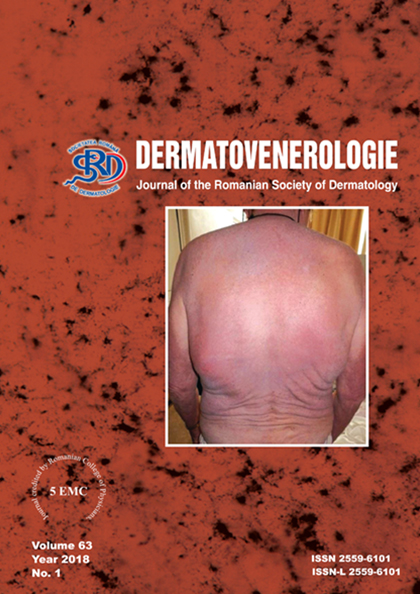Introduction: Androgenetic alopecia (AGA) in women is a common pathology but with a low success rate of drug therapy. The local inflammation has been shown to play an important role in the pathogenesis of the disease, this fact providing us with the opportunity to develop new therapies and to customize the existing ones. The systemic inflammation in AGA has not been extensively studied, but it raises the possibility of identifying new cardiovascular risk factors among female patients with AGA.
Objective: The aim of this study was to identify the association between the presence of androgenetic alopecia in women and the increase of certain serum markers of systemic inflammation (ESR, fibrinogen, CRP, TNF-a, IL-6).
Material and Method: The study was of observational, analytical, transversal, prospective, case-control type. It included a group of 30 female patients with AGA (age range of 30 to 60 years) and a control group of 30 patients without injuries of skin appendages, selected from the patients that addressed to the Dermatovenerology ambulatory and unit of the County Emergency Clinical Hospital of Oradea, between January 1st and December 31st, 2016. In order to evaluate the systemic inflammation (CRP, fibrinogen, VSH, TNF-a and IL-6), venous blood samples were collected between 8 and 9 a.m., 12 hours after the last meal, the consumption of alcohol being prohibited for 24 hours prior to collecting specimens.
Results: Statistically, CRP levels were significantly higher in the alopecia group compared to the control group (p = 0.05). No statistically significant differences were observed for the other analyzed parameters (p > 0.05). The Spearman's rho coefficient revealed a strong direct correlation between ESR and CRP (p < 0.001). IL-6 and TNF-a were not correlated with any of the other inflammatory markers.
Conclusion: Our study has revealed the presence of a certain degree of systemic inflammation through high ESR and CRP values in the androgenetic alopecia group compared to the control group. A correlation between IL 6, the serum TNF-a and AGA in women could not be demonstrated.


